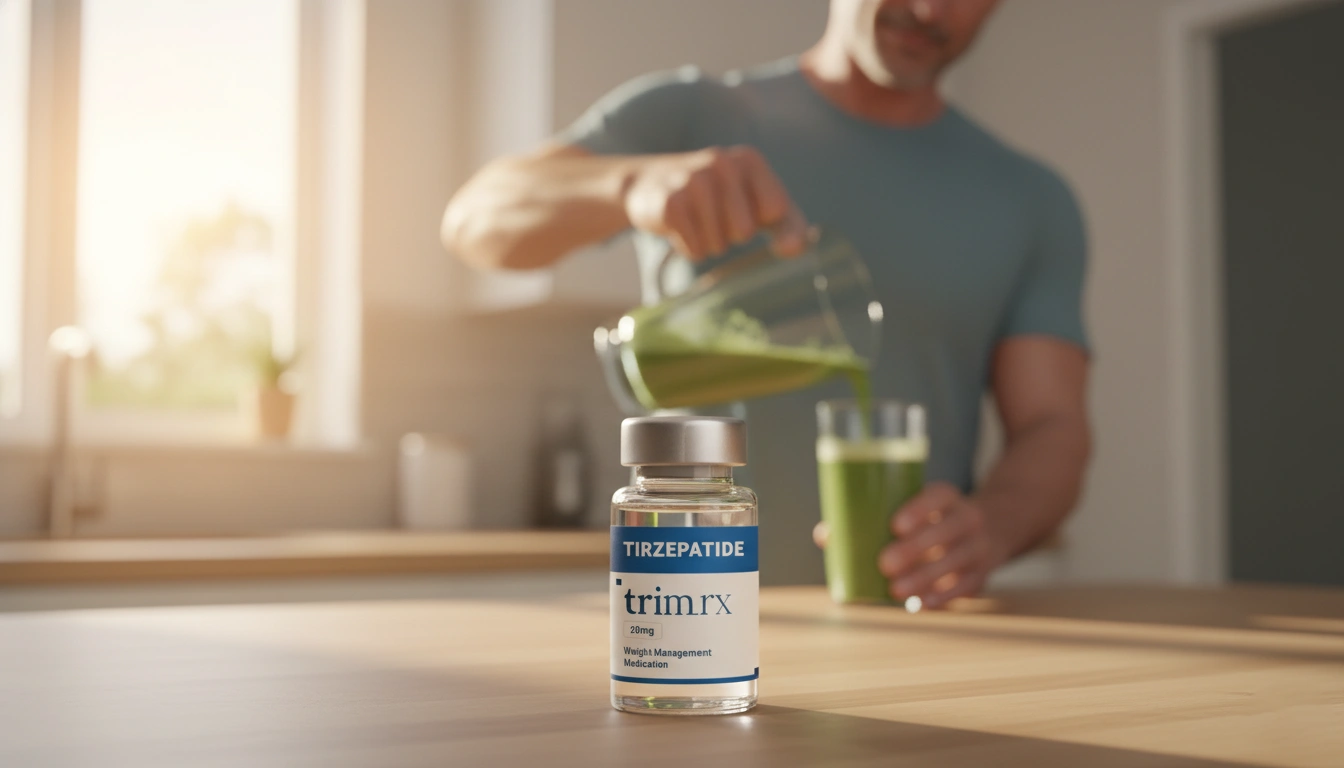Why Am I Still Hungry on Tirzepatide? Insights and Solutions for Your Weight Loss Journey

Introduction
Hunger is a powerful force, intricately tied to both our physiology and emotions. Many who embark on weight loss journeys with medications like tirzepatide anticipate a quick, marked reduction in appetite. But what happens when the hunger pangs persist, or even intensify, despite being on this advanced GLP-1 receptor agonist? Understanding why am I still hungry on tirzepatide is not only common but essential for tailoring an effective, sustainable weight loss strategy.
At TrimRx, we’ve witnessed the transformative potential of medications like tirzepatide combined with personalized care. While these treatments can significantly suppress appetite and support weight management, individual responses vary. Together, we'll explore the science behind tirzepatide’s appetite effects, uncover reasons why you might still feel hungry, and discuss practical strategies—including dietary and lifestyle modifications—to help optimize your results.
This blog will first unravel how tirzepatide influences hunger and metabolism, then dive into the factors that could be fueling persistent hunger despite medication use. We'll provide evidence-based nutrition and lifestyle recommendations designed to complement tirzepatide’s mechanism. Throughout, you'll discover how TrimRx’s personalized, clinically supported programs can assist you, including our free assessment quiz to identify the best medication options for your unique needs and our quick-access supplements that support hunger regulation.
By the end, you’ll gain clarity on managing hunger while on tirzepatide and learn how to harness this medication as a powerful tool in your weight loss journey.
How Tirzepatide Works to Affect Hunger and Weight Loss
Tirzepatide is a novel injectable medication designed to support weight loss and blood sugar regulation by mimicking two naturally occurring hormones: GLP-1 (glucagon-like peptide-1) and GIP (gastric inhibitory polypeptide). These hormones play crucial roles in appetite control, digestion, insulin action, and energy metabolism.
Here’s how tirzepatide helps regulate hunger:
- Slows Gastric Emptying: By slowing the rate at which food leaves your stomach, tirzepatide promotes a prolonged feeling of fullness, signaling the brain that you’ve eaten enough.
- Enhances Insulin Secretion and Glucose Regulation: This not only assists in blood sugar balance but reduces cravings often triggered by blood sugar fluctuations.
- Direct Appetite Suppression: It activates receptors in the brain's hunger control centers, reducing food-seeking behavior and overall appetite.
The combined effect ideally results in decreased hunger, fewer cravings, and smaller portion sizes, supporting gradual, sustainable weight loss.
However, it’s important to acknowledge that individual responses vary. Some people experience more pronounced appetite suppression earlier, while others take longer to reach these effects. This variation can contribute to why some individuals remain hungry even after starting tirzepatide.
Why Am I Still Hungry on Tirzepatide? Common Explanations
If you’re wondering, “Why am I still hungry on tirzepatide?” you’re not alone. Many using this medication report varying levels of hunger. Here are key reasons this can happen:
1. Your Dosage Is Still Low or Adjusting
Tirzepatide treatment usually begins with a low dose (e.g., 2.5 mg) to minimize side effects and allow your body to acclimate. Appetite suppression tends to grow stronger as the dose increases, often over several weeks to months. If you’re still at a starting or intermediate dose, hunger may not yet be fully controlled.
A common timeline for appetite changes with tirzepatide is:
- First few weeks: Some may feel reduced hunger, others may feel little difference.
- 4-8 weeks: Drug concentration reaches steady state; more significant appetite suppression typically develops.
- 12+ weeks: Maximum benefits on hunger reduction and weight loss often appear near the maintenance dose (up to 15 mg).
Patience is crucial during this titration phase. Rushing dose increases without medical guidance can add risks.
2. Your Body is Adjusting to the Medication
Even at a consistent dose, your body adapts over time. This adaptation can involve temporary fluctuations in hunger due to changes in hormone levels and digestion speed. It’s possible to experience transient hunger pangs as your system recalibrates, especially around dose increments.
3. Emotional or Psychological Hunger
Not all hunger is physical. Emotional hunger—eating triggered by stress, boredom, sadness, or habit—can persist despite the appetite-suppressing effects of tirzepatide. This form of hunger can feel intense and sometimes indistinguishable from true physiological hunger.
Addressing emotional eating requires conscious strategies beyond medication, such as stress reduction, mindfulness, and healthy coping mechanisms.
4. Diet Composition and Nutrient Quality
What you eat greatly influences feelings of fullness. A diet high in ultra-processed foods, refined sugars, or simple carbohydrates can cause rapid blood sugar spikes and crashes, prompting hunger soon after eating. Conversely, protein, fiber, and healthy fats promote satiety and stabilize blood sugar.
Even with tirzepatide slowing digestion, a diet lacking in nutrient-dense foods might leave you feeling unsatisfied, leading to persistent hunger.
5. Caloric and Nutritional Intake May Need Adjustment
If your calorie intake is either too low or unbalanced, your body might signal hunger to protect itself from perceived energy shortage. Ensuring adequate nutrition, especially lean protein and fiber, can help maintain muscle mass, metabolic rate, and stable blood sugar, reducing hunger cues.
6. Individual Differences in Response
Every person metabolizes and responds to medications differently. Factors such as genetics, underlying metabolic health, gut microbiome composition, and concurrent medications can affect tirzepatide's appetite-suppressing effects.
7. Potential Medication Tolerance
Long-term use may lead to partial tolerance where the initial hunger suppression diminishes. This effect might warrant dose adjustments or complementary strategies under healthcare professional guidance.
What Can You Do if You’re Still Hungry on Tirzepatide?
Understanding why hunger persists is the first step toward managing it effectively. Here are action-oriented strategies to support you:
Be Patient and Stick to Your Dose Schedule
Understand that tirzepatide’s full appetite control may take time, often several weeks or months. Resist the temptation to adjust doses without consulting your healthcare provider. Our personalized programs at TrimRx help monitor your progress and guide safe dosage increments, ensuring both efficacy and safety. You can start with our free assessment quiz to see which treatment options fit your needs:
Prioritize a Nutrient-Dense, Balanced Diet
Maximize tirzepatide’s benefits with foods that enhance satiety and stabilize metabolism. Focus on:
- Lean Protein: Supports fullness, muscle preservation, and metabolism. Examples include chicken, fish, eggs, dairy like Greek yogurt, tofu, and legumes.
- Fiber-Rich Foods: Promote digestion and prolong fullness. Incorporate vegetables, whole grains (like oats, quinoa), fruits (apples, berries), and beans.
- Healthy Fats: Monounsaturated fats from avocado, nuts, seeds, and olive oil encourage satiety and support hormonal balance.
- Hydration: Drinking ample water helps reduce misinterpreted thirst-hunger signals, supports digestion, and helps prevent constipation—a common side effect of tirzepatide.
When hunger strikes, opt for protein-rich snacks or a handful of nuts rather than processed carbs or sugary treats, which can spike hunger rather than sate it.
For quick nutritional support, TrimRx offers GLP-1 Daily Support and Weight Loss Boost supplements. These can complement your weight loss regimen by enhancing metabolic and satiety signals:
Avoid Foods That Aggravate Hunger or Side Effects
Certain foods may counteract tirzepatide's effects or cause digestive discomfort:
- Ultra-Processed and Sugary Foods: Encourage blood sugar spikes and hunger cycles.
- Fried and Fatty Foods: Can cause nausea and slowed digestion.
- Alcohol: Adds empty calories, dehydrates, and may worsen gastrointestinal symptoms.
- Carbonated Beverages and Caffeine: May cause bloating or irritate the digestive tract.
Minimizing these helps maintain balanced hunger levels and improves comfort.
Manage Emotional Eating
Since medications primarily address physical hunger, it’s crucial to develop strategies for emotional hunger:
- Practice mindful eating by tuning into real hunger vs. emotional triggers.
- Explore stress reduction techniques like meditation, deep breathing, or hobbies.
- Seek support—whether from healthcare professionals, counselors, or support groups—to reprogram emotional eating habits.
Monitor Your Progress and Stay in Touch with Your Provider
If persistent hunger continues beyond 8–12 weeks or significantly interferes with your daily life, consult your healthcare provider. Adjustments to dose or alternative therapies might be necessary.
At TrimRx, our comprehensive weight loss programs include ongoing medical consultations, lab work, and support to help you adapt and succeed safely. Remember, weight loss medications like tirzepatide are tools designed to support your journey—they work best when paired with personalized care and lifestyle changes.
How TrimRx Supports Your Weight Loss Journey with Tirzepatide
Our mission at TrimRx is to make sustainable weight loss attainable through personalized, clinically-supported telehealth care. Our seamless platform personalizes your treatment plan based on your unique health profile, ensuring medication, nutrition guidance, and support align with your goals.
- We begin with a simple, free assessment quiz to determine your eligibility for prescription medications like tirzepatide or semaglutide, ensuring you receive the most effective and safe treatment.
Take Our Personalized Weight Loss Quiz Now
- Our clinicians work closely with FDA-registered, inspected pharmacies to deliver trusted medications like compounded tirzepatide, Ozempic®, Wegovy®, and more directly to your doorstep.
- We also offer quick-access, supportive supplements that do not require a quiz to order immediately, such as GLP-1 Daily Support and Weight Loss Boost, designed to enhance satiety and metabolic well-being.
Explore Our Support Supplements
Our approach combines science, empathy, and transparency—we believe safe, effective, and individualized weight loss is a partnership that adapts to your evolving needs.
Summary: Key Takeaways to Manage Hunger on Tirzepatide
- Hunger on tirzepatide is common, especially early in treatment or during dose adjustments.
- Patience matters: dosage titration over weeks or months enhances appetite control.
- Diet quality is critical: nutrient-dense foods rich in protein, fiber, and healthy fats support fullness.
- Emotional hunger needs addressing with mindfulness and healthy coping mechanisms.
- Use hydration and avoid processed or high-sugar foods to stabilize blood sugar and reduce hunger spikes.
- Stay connected with healthcare providers for dose adjustments or additional support.
- Utilize TrimRx’s personalized programs and supplements to optimize your weight loss journey safely and effectively.
Are you ready to explore personalized tirzepatide treatment tailored to you? Start with our quick, free quiz to find out which options could best fit your goals and lifestyle:
Begin Your TrimRx Weight Loss Assessment Today.
FAQ
Q1: Is it normal to still feel hungry on tirzepatide?
Yes. Especially during the first several weeks or at lower doses, feeling some hunger is typical as your body adjusts. Complete appetite suppression is neither required nor recommended for safe weight loss.
Q2: How long does it take for tirzepatide to reduce hunger effectively?
Tirzepatide typically reaches steady-state concentration in 4–8 weeks, with stronger appetite suppression often visible between 3 to 6 months, particularly at maintenance doses (up to 15 mg).
Q3: Can diet affect how hungry I feel on tirzepatide?
Absolutely. Diets high in protein, fiber, and healthy fats promote fullness and reduce hunger. Conversely, eating many processed or sugary foods can cause blood sugar fluctuations that increase hunger regardless of medication.
Q4: What if I feel hungrier after increasing my tirzepatide dose?
Temporary hunger increases sometimes occur as your body adjusts to a new dose. If persistent, discuss with your healthcare provider to ensure the dose and overall treatment plan are optimal.
Q5: Can emotional eating cause hunger even on tirzepatide?
Yes. Emotional or psychological hunger can persist despite the medication’s physical appetite suppression. Managing emotional triggers through mindfulness, support, and healthy coping helps improve results.
Q6: Are there supplements that support appetite control alongside tirzepatide?
Yes. At TrimRx, we provide quick-access supplements like GLP-1 Daily Support and Weight Loss Boost to help regulate hunger and support metabolism during your weight loss journey.
Q7: How do I get started with tirzepatide treatment through TrimRx?
Begin by taking our free, confidential online assessment quiz, which reviews your health profile and determines qualification for tirzepatide or other personalized options. From there, our clinicians guide you through the next steps.
Embrace a thoughtful, supported approach to addressing hunger on tirzepatide. With the right tools, guidance, and persistence, you can regain control over your appetite and health. At TrimRx, we’re here every step of the way to empower your journey. Take the first step toward personalized weight loss care today.

Transforming Lives, One Step at a Time
Keep reading
Navigating Your Path to Health: When Should You Increase Tirzepatide Dose?
Wondering when should you increase tirzepatide dose for weight loss? Learn the science behind dose escalation, typical schedules, and how to manage side effects for optimal results. Get personalized, medically supervised care with TrimRx.
Navigating Your Journey: When Should I Up My Dose of Tirzepatide for Optimal Weight Loss?
Wondering ‘when should I up my dose of tirzepatide’? Learn about dose escalation, signs it’s time to adjust, and managing side effects for effective weight loss. Get personalized guidance from TrimRx.
Tirzepatide Dosing: When to Go Up a Dose for Optimal Progress
Wondering when to go up a dose on tirzepatide? Learn the key signs, dosing schedule, and safety tips for optimal weight loss and minimal side effects.



